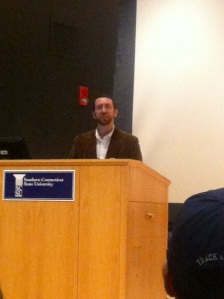Jene Thomas – General Assignment Reporter
Vampires and Call of Duty were all used as subject matter in a lecture on war drones, but the only myth was that drone operators suffer less than combat soldiers.
Visiting philosophy professor Dr. Nolen Gertz, of Pacific Lutheran University in Tacoma, Wash., addressed common misconceptions of drone operators in his lecture of, “The Myth of Unmanned Warfare: Drone Operators, Cyber Warriors, and Prosthetic Gods” Nov. 14 in Engelman C112.
His lecture focused on how little people realize that although the drones are unmanned, those who operate the drones experience the operation more than a soldier on foot may experience it.
“Anything we do to try to get rid of suffering just creates more suffering,” Gertz said.
Five years ago, President Barack Obama announced that unmanned aerial drones were to be used in the war on terror. Since then, people have solely focused on the death tolls from the airstrikes and the science fiction fears of the rise of machines.
 Gertz said more misconceptions come from fears “of an unfeeling, uncaring, unstoppable army of robot machines marching in wave after wave toward whatever disparate groups of human resistance fighters would dare challenge them.”
Gertz said more misconceptions come from fears “of an unfeeling, uncaring, unstoppable army of robot machines marching in wave after wave toward whatever disparate groups of human resistance fighters would dare challenge them.”
However, he said he wanted to focus more on the people behind the drones and what they go through. He suggested there was evidence that those who operate the drones are suffering more than those who fight the war on terror in the tradition sense.
To give the audience a sense of what it feels like to operate the drone, he offered numerous comparisons.
He gave the example of it being like playing a videogame on a split screen, crediting Paolo Pedercini and Jim Munroe for their idea. The inside of the drone can have six screens. He brought up a game called, “Unmanned” where a drone tours a war area, finds the terrorist target and cares for a family simultaneously, except it isn’t actually a game. It is the multitasking of a drone operator.
Another fictional comparison used was comparing it drone operation to a “daywalker,” who is half human and half vampire. The “daywalker” has both human experiences and vampire experiences, just as a drone operator. They would have to experience people being killed and areas being destroyed by the warfare as if they were in the war front, but they have the experience of being in an operation room.
One of the misconceptions mentioned was the operators wouldn’t experience as much as a soldier in the war zone but Gertz said there was, “no room for escapism.”
Though there is dissociation present in the solider controlling the drone, they actually experience more symptoms of post-traumatic stress disorder. Because of the multiple screens and the ability to record operations, some may have to rewatch events or see it on multiple screens, instead of shooting a target, packing up and leaving the scene.
He said the dissociation comes from the fact that the subordinates, “want to be able to act without making decisions” while commanders, “want to be able to make decisions without have to care about the consequent action.”
Many of the philosophy professors here at Southern Connecticut State University were in attendance at the lecture. Professor Volkman said the comparison between the operating drones and touch football stuck with him.
Gertz gave an example of touch football to explain how people see operating drones as not “real” warfare just as touch football may not be considered “real” football.
Gertz’s lecture came from his book, “The Philosophy of War and Exile: From the Humanity of War to the Inhumanity of Peace.” Southern is the first university to host his public talks on unmanned warfare.
“We’re very excited he could be with us here,” said Chelsea Harry, professor of philosophy here at Southern.
Photo Credit: Derek Torrellas, Jene Thomas




























































































